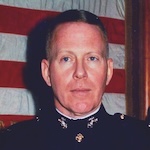MISSION ACCOMPLISHED
By Joe Gombach
“I bought into Phi Psi completely from the beginning – the brotherhood, camaraderie, prevailing ethos, emphasis on gentlemanly virtues and, of course, the parties. I pledged because I liked the brothers, loved the chapter house and chapel, and believed (correctly) that Phi Psi was the best Fraternity.” Anyone reading this would likely say something similar, but how many would be willing to leave their chapter and start all over somewhere new?
Retired Brig. Gen. David C. Hague Florida ’67 (WVU ’63) was a sophomore when he answered an appeal from the national headquarters to start a Phi Psi colony at the University of Florida. A native West Virginian, he wasn’t looking to transfer or leave his friends behind.
The mission to build a new Phi Psi chapter and spread the Fraternity’s values was what appealed to Hague, and he has never shied away from a call to service. “I live with energy, a certain amount of style, enthusiasm and humility. Being a Phi Psi and a Marine makes humility difficult.”
After meeting with Executive Director Dud Daniel Arizona ’47 and Dr. Louis D. Corson WVU ’34 over dinner at the Pittsburgh airport, Hague accepted the challenge. He left his home state, transferred schools and started the hard work of establishing a new colony, entirely on his own, in the fall of 1964.
“I sallied forth with missionary zeal to create a chapter like West Virginia Alpha at the University of Florida.”
One of the brothers Hague recruited in those early years was Joel Aptaker Florida ’67. Their first conversation nearly 60 years ago began a lifelong friendship. This article was Aptaker’s idea. “David’s a great husband, great father and great friend,” Aptaker said. “He’s just too good a guy not to have something written about him.”
Florida Beta received its charter in April 1967. Hague graduated that spring, at the height of the Vietnam War. He said Phi Psi taught him that the “formula for success was setting and maintaining exact standards and creating a loyal and supportive brotherhood. I looked for a similar organization when Uncle Sam called for help. The Marine Corps filled the bill.”
Hague took another important step in life before the year was out. He got married.
“I became a husband and Marine at the same time,” he said. “Everything I have accomplished since has been possible only because of the love and support of my wife, Carolyn, and our two children, Stephen and Ashley.”
Hague deployed to Vietnam in 1968-69 and served in a variety of combat roles as an artillery officer. His long, distinguished military career was only beginning.
Once back stateside, he attended law school at West Virginia University while continuing to serve as a reserve officer. He then returned to active duty as a judge advocate and later attained master’s degrees from Georgetown and the Naval War College.
Throughout his career in the Marines, Hague took on a number of roles. He spent six years in the courtroom as prosecutor, defense counsel and military judge. He was the Marine Corps public affairs officer in New York City, head of the Marine Corps worldwide legal assistance program, executive officer of the Naval Justice School, and senior legal advisor at Quantico and Okinawa.
While at Quantico, Hague oversaw the resolutions of two high-profile cases: the Tailhook sexual assault scandal and the Lonetree espionage case.
Hague retired in 1998 as Assistant Judge Advocate General of the Navy for Military Justice, but he was recalled to active duty several times. In 2001, he chaired the National Security Case Commission, served as Counsel for the Secretary of Defense Interrogation Special Focus Team in 2004, and was the General Counsel of the 2005 Defense Base Closure and Realignment Commission.
Hague also has worked extensively with the American Bar Association to promote service members’ interests, participating in programs to address domestic violence, at-risk youth and re-employment rights. As military deployments increased during the War on Terror, Hague spearheaded the ABA’s effort to enlist the civilian legal community to assist military members and families with their personal legal affairs.
He’s still involved in the military community. “I stay informed and occasionally participate in events such as a dinner last week in Washington honoring Gary Sinise,” he said.
Hague is also active in the Phi Psi community. “I celebrate Founders Day every year with brothers from Florida Beta and recently joined an impressive group of brothers in Orlando for pizza and beer,” he said. “A new alumni association is in the making. Email, text, phone calls and personal contact keep the Phi Psi spirit alive.”
Do you have a brother’s story you’d like to tell (or write)? Please let us know: marketing@phikappapsi.com

